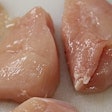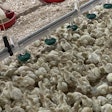Animal health company Harrisvaccines, Ames, Iowa, has been issued a conditional license from the USDA’s Animal and Plant Health Inspection Service (APHIS) for a vaccine that may aid in the control of porcine epidemic diarrhea (PED) virus in swine. This is the first licensed vaccine for PED virus.
The PED virus vaccine will be used to vaccinate sows with the intent that they build antibody, and transmit that antibody through their milk to newborn piglets, protecting them from PED virus.
APHIS licenses veterinary biologics products for use in controlling diseases of animals. Conditional licenses are issued based on full safety, purity testing, and an expectation of efficacy. Preliminary studies have been promising, and they’ve shown sufficient data to lead APHIS to believe the vaccine will be effective. The company will continue working toward completing the requirements for a full license. In the meantime, there are no restrictions on vaccine use under the conditional license.
APHIS supports and encourages the rapid development of new vaccines, particularly in emergency situations. When a company obtains a conditional license they are able to bring an important disease management tool to producers safely and quickly. Full licensing can occur subsequently while producers get the products they need to protect animal health.
PED virus, first discovered in the U.S. in May 2013, causes significant sickness in swine, affecting their growth and health, and causes high mortality in piglets.
Recently APHIS announced the availability of $26.2 million in funding to combat these diseases and issued a Federal Order requiring the reporting of new detections of PED virus and other new swine enteric coronavirus disease to APHIS or state animal health officials. The Federal Order also requires that operations reporting these viruses work with their veterinarian or USDA or State animal health officials to develop and implement a reasonable management plan to address the detected virus and prevent its spread. Plans will be based on industry-recommended best practices, and include disease monitoring through testing and biosecurity measures. These steps will help to reduce virus shed in affected animals, prevent further spread of the disease, and enable continued movement of animals for production and processing.

















